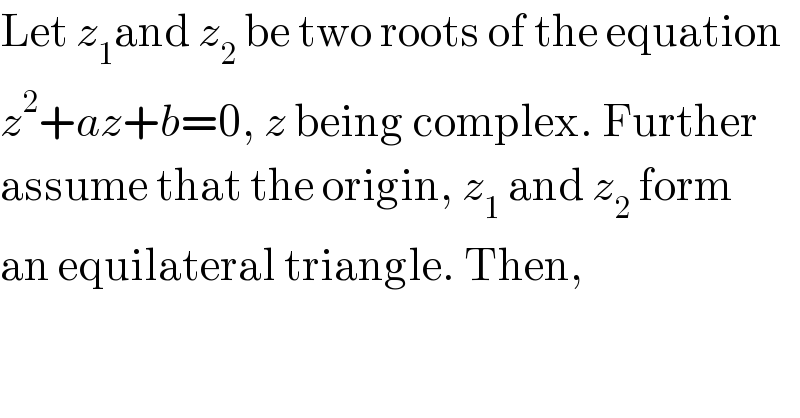Question Number 25075 by Mr easy last updated on 03/Dec/17

$$\mathrm{Let}\:{z}_{\mathrm{1}} \mathrm{and}\:{z}_{\mathrm{2}} \:\mathrm{be}\:\mathrm{two}\:\mathrm{roots}\:\mathrm{of}\:\mathrm{the}\:\mathrm{equation} \\ $$$${z}^{\mathrm{2}} +{az}+{b}=\mathrm{0},\:{z}\:\mathrm{being}\:\mathrm{complex}.\:\mathrm{Further} \\ $$$$\mathrm{assume}\:\mathrm{that}\:\mathrm{the}\:\mathrm{origin},\:{z}_{\mathrm{1}} \:\mathrm{and}\:{z}_{\mathrm{2}} \:\mathrm{form} \\ $$$$\mathrm{an}\:\mathrm{equilateral}\:\mathrm{triangle}.\:\mathrm{Then}, \\ $$
Answered by ajfour last updated on 03/Dec/17
![z_2 =z_1 e^(±i(π/3)) and z_1 z_2 =b z_1 +z_2 =−a ⇒ z_2 ^3 =−z_1 ^3 or (z_1 +z_2 )[(z_1 +z_2 )^2 −3z_1 z_2 ]=0 ⇒ −a[a^2 −3b]=0 ⇒ a=0 or a^2 =3b .](https://www.tinkutara.com/question/Q25079.png)
$${z}_{\mathrm{2}} ={z}_{\mathrm{1}} {e}^{\pm{i}\frac{\pi}{\mathrm{3}}} \:{and}\:\:{z}_{\mathrm{1}} {z}_{\mathrm{2}} ={b} \\ $$$${z}_{\mathrm{1}} +{z}_{\mathrm{2}} =−{a} \\ $$$$\Rightarrow\:\:{z}_{\mathrm{2}} ^{\mathrm{3}} =−{z}_{\mathrm{1}} ^{\mathrm{3}} \\ $$$${or}\:\:\:\left({z}_{\mathrm{1}} +{z}_{\mathrm{2}} \right)\left[\left({z}_{\mathrm{1}} +{z}_{\mathrm{2}} \right)^{\mathrm{2}} −\mathrm{3}{z}_{\mathrm{1}} {z}_{\mathrm{2}} \right]=\mathrm{0} \\ $$$$\Rightarrow\:\:\:−{a}\left[{a}^{\mathrm{2}} −\mathrm{3}{b}\right]=\mathrm{0} \\ $$$$\Rightarrow\:\:\:\:\:{a}=\mathrm{0}\:\:\:\:{or}\:\:{a}^{\mathrm{2}} =\mathrm{3}{b}\:. \\ $$
